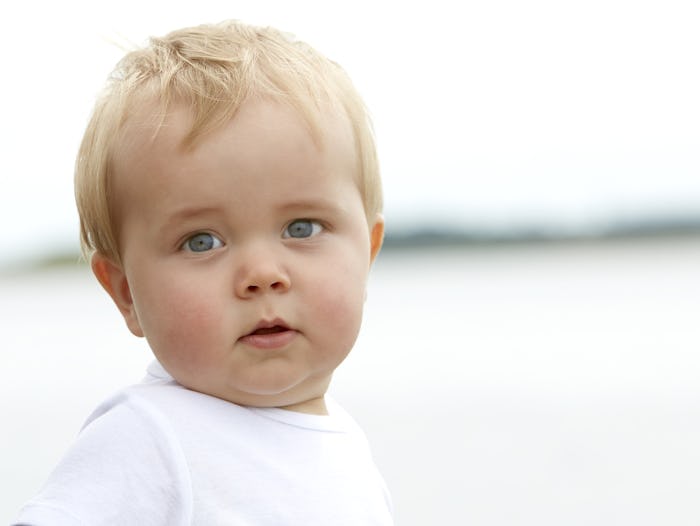I cringe when I hear stories of the many ways my parents and grandparents would unknowingly put my siblings and me at risk when we were babies. Car seats? A mere suggestion. Seat belts? What are those? Bike Helmets? Those are for suckers. Thanks to published recommendations by the American Academy of Pediatrics (AAP), parents have become more aware and educated about child safety practices. With new research studies, recommendations are constantly being updated so there's a good chance that there are still some things you do everyday that actually aren't safe for your baby.
As recently as 16 years ago, my kids' pediatrician recommended a side sleeping wedge pillow for my newborn son, and today side sleeping is a big no-no for babies. Bath seats and bath rings were a life saver for me, and after looking for one to give as a gift, there were none to be found. I ended up doing some online research and learned that in the last six years the Consumer Product Safety Commission (CPSC) updated the mandatory standards for bath seats and none on the market met the criteria.
Because safety guidelines are ever changing, here are some things you may still be doing that are not safe for your baby.
1Letting Your Baby Nap In A Car Seat
In April of 2015, Medical Daily reported that the US Consumer Product Safety Commission (CPSC) and Children's National Medical Center have begun to call attention to the dangers of improperly using infant sitting and carrying devices. The researchers found that allowing babies to sleep in car seats increases their chances for suffocation, asphyxiation, and entrapment.
Your baby is going to fall asleep in the car, there is no way around that. But once you are done with your drive, you should transfer your baby into a safe sleeping surface instead of allowing them to continue their nap in the carrier car seat. If you are on a long road trip, What To Expect recommended pulling over every one or two hours to take your baby out of the car seat. It's also a good idea to have another adult sit in the back to make sure your baby is breathing properly and not becoming overheated.
2Keeping Your Baby In A Swing Too Long
Infant swings pose the same dangers of suffocation, asphyxiation, and entrapment as car seats. According to the American Academy of Pediatrics (AAP) if your baby falls asleep in a swing, you should transfer her to a crib or bassinet as soon as possible. Baby Center warned against using a baby swing for more than one hour per day, as this can delay the development of motor skills that lead to crawling, pulling up, and cruising.
3Covering Your Carrier Or Stroller With A Blanket
Parents do this often to block out the sun or to protect their baby from the wind or rain. But this practice can be dangerous as babies are already prone to get hot in their strollers or car seats, and covering the entire device with a blanket can cause them to overheat, one of the risk factors for SIDS. Seattle pediatrician Dr. Wendy Sue Swanson told Today that it is possible to create a greenhouse effect in an enclosed space, even if you use a muslin cloth or other thin, breathable fabric.
4Microwaving Baby Bottles
Le Leche League International (LLLI) noted that warming breast milk or formula in the microwave can cause uneven heating creating "hot spots" that can burn your baby's mouth and throat. You are also at risk of overheating the milk when you warm it in the microwave, which according to the Centers For Disease Control and Prevention (CDC), can destroy the nutrient quality of the expressed milk. Additionally, the AAP warned that some bottles are made of polycarbonate, or have a lining that contains the chemical bisphenol A (BPA) which can be released when exposed to the heat of the microwave. To be extra safe, avoid clear plastic baby bottles or containers with the recycling number 7.
5Letting Your Baby Sit In Soapy Bath Water
Most babies love their bath time, but did you know that sitting in soapy bath water can increase the risk of a urinary tract infection (UTI) in babies? Baby girls in particular are susceptible due to their shorter urethra. According to Dr. Sears, bubble bath, soap, and shampoo suds can irritate and wash away the protective mucus layer of the urethra.
6Using Air Fresheners
I love for my house to smell like a pine tree in the winter, or a flower meadow in the spring, but apparently some air fresheners are dangerous for our health, and even more harmful to your baby. According to the American Grandparents Association (AGA), some air fresheners contain allergens and chemicals that can impair lung function and cause hormonal issues such as volatile organic compounds (VOCs), formaldehyde, phthalates, and 1,4 dichlorobenzene (1,4 DCB). Opening your windows, brew tea or bake some cookies to instantly and safely transform the scent of the air in your home.
